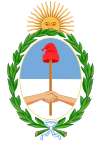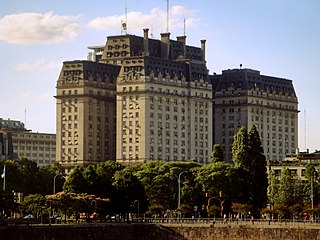
The Ministry of Defense of Argentina is a ministry of the national executive power that oversees and advises on matters of national defense, including overseeing the Argentine Armed Forces.

Johana Farina Pesántez Benítez is an Ecuadorian politician, she was Minister of Justice, Human Rights and Religious Affairs between 13 May 2011 and 18 June 2013. Since 24 May 2017 she has been judicial advisor to President Lenín Moreno.
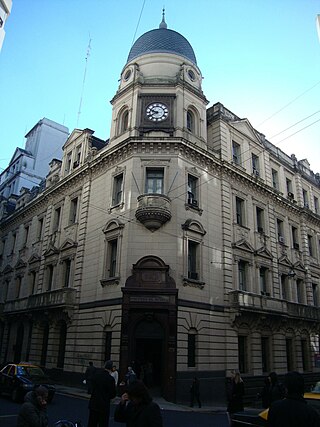
The Ministry of the Interior of Argentina is a ministry of the national executive power that manages issues pertaining to domestic politics such as immigration and co-ordination between the federal government and the governments of the provinces of Argentina.
The Ministry of Transport of Argentina was a national executive agency that managed transportation issues, including land, air, and sea transportation within the country.

The Ministry of Health of Argentina is a ministry of the national executive power that oversees, elaborates and coordinates the Argentine national state's public health policy. The ministry is responsible for overseeing Argentina's highly decentralized universal health care system, which according to 2000 figures, serviced over half of the country's population.

The Ministry of Public Works of Argentina was a ministry of the national executive power that oversaw and advised on the elaboration and maintenance of roadways, urban and hydraulic infrastructure and other types of public works.

The Ministry of Culture of Argentina was a ministry of the national executive power that oversaw the government's public policy on the culture of Argentina.

The Ministry of Productive Development of Argentina was a ministry of the national executive power overseeing and advising on the promotion of industrial policies and foreign trade in Argentina.

Germán Carlos Garavano is an Argentine lawyer and expert on judicial reform, and the former minister of Justice and Human Rights of Argentina between 2015 and 2019. He was Attorney General of the city of Buenos Aires between 2007 and 2014 and substitute Councillor of the Council of Magistracy of Argentina.
The Ministry of Justice and Human Rights of Chile is the Ministry of State responsible for the law and judiciary. The current Minister of Justice and Human Rights is Luis Cordero, who has served since January 11, 2023.
The Ministry of Justice, Human Rights and Cults of Ecuador is the State portfolio in charge of justice in Ecuador. It was created on November 15, 2007 during the presidency of Rafael Correa. The Ministry was created in view of the need for a "coordinated and joint work of all justice operators, whose objective is to optimize the plans and projects of the judicial function, the Public Ministry, the Social Rehabilitation Directorate and other institutions related to the justice system." Its purpose, according to its official site, having achieved "the full observance of human rights" by 2017.
The secretary of state for justice (SEJUS) is the second-in-command to the Spanish minister of justice. The secretary of state is appointed by the monarch at the request of the justice minister and after hearing from the Council of Ministers.
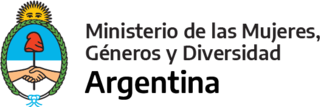
The Ministry of Women, Genders and Diversity was a ministry of the Argentine Government tasked with overseeing the country's public policies on issues affecting women and gender and sexual minorities. The ministry was created in 2019, as one of the initial measures of President Alberto Fernández; the first minister was Elizabeth Gómez Alcorta.

The Ministry of Agriculture, Livestock and Fisheries of Argentina, commonly known simply as the Ministry of Agriculture, was a ministry of the national executive power that oversaw production, commerce and health regulations in the agricultural, livestock and fishing industries.
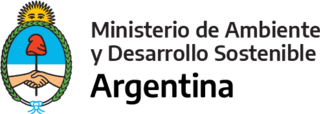
The Ministry of the Environment and Sustainable Development of Argentina was a ministry of the national executive power that oversaw the government's policy on environmental issues and promotes sustainable development.

The Ministry of Territorial Development and Habitat of Argentina was a ministry of the national executive power that oversaw and defined the Argentine state's policies on housing and habitat.
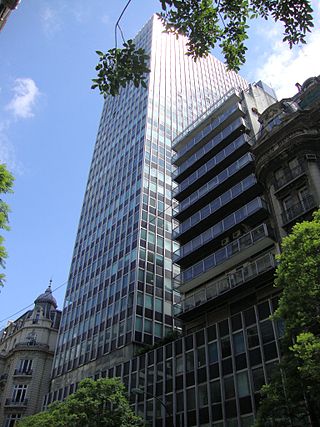
The Ministry of Tourism and Sports of Argentina was a ministry of the national executive power that oversaw and advised on Argentina's national tourism industry and the Argentine state's sports policy.

The Legal and Technical Secretariat of the Presidency of the Argentine Nation is a secretariat of state of the Argentine National Executive counting with ministerial level, tasked with assisting the President of Argentina, the Chief of the Cabinet of Ministers and all other dependencies of the President's Office that may not count with their own legal departments on the drafting of decrees, legislative bills, administrative decisions and legal messages.
The Secretariat of Comprehensive Policies on Drugs is a secretariat of state of the Argentine National Executive reporting to the Chief of the Cabinet of Ministers, tasked with assisting the population on drug use prevention and the treatment of drug addiction.
Memory, Truth and Justice processes is the name with which the processes that culminate in trials for crimes against humanity carried out against those responsible for human rights violations committed in the context of state terrorism during the last civil-ecclesiastical-military dictatorship in Argentina between 1976 and 1983 are referred to. These include the actions of Human Rights organizations, such as Mothers of the Plaza de Mayo, Grandmothers of the Plaza de Mayo or HIJOS, as well as different public policies such as the creation of CONADEP, the creation of reparation laws, the restitution of appropriated children, the Trials for the Truth, the marking of Sites of Memory in Argentina in the areas where clandestine detention centers operated and the creation of Spaces of Memory.
















